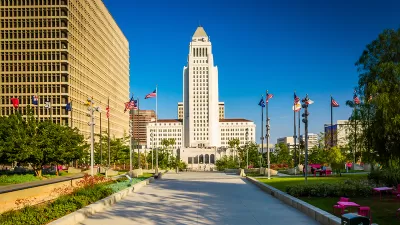The soul of planning in Los Angeles will be up for vote in the citywide election that will occur on the same day as the U.S. presidential election.
Josh Stephens provides a thorough examination of the Neighborhood Integrity Initiative, the controversial Los Angeles ballot initiative scheduled for citywide vote in November 2016. According to Stephens, the initiative "would upend Los Angeles’ approach to both project approvals and long-range planning."
"Among other provisions, the initiative would effectively place a two-year moratorium on all development that does not conform to adopted plans. It calls for the city to update its Community Plans — of which there are 37 — and forbids the City Council from granting plan amendments, which supporters of the initiative derisively refer to as 'spot zoning,' to nonconforming projects," adds Stephens.
The article includes a lot more specifics about the specific measures proposed by the initiative, as well as sharing opinions and insight about the ballot initiative from civic leaders on both sides of the issue.
Included among the many interviews Stephens conducted for the article is leadership from the Coalition to Preserve L.A. (CPLA), the group behind the initiative. Here, Stephens sums up the agenda of the initiative:
CPLA hope for the initiative to bring predictability to the city’s development process and even help combat the city’s notorious shortage of affordable and workforce housing. They say that the current system invites developers to pressure the city to approve larger and more luxurious — and therefore more profitable — projects. If developers know that a parcel is zoned only for a certain type of property, developers will avoid the lengthy negotiation process in favor of simply adhering to statute. (The initiative would not affect ministerial approvals such as variances.)
Stephens casts a wide net in setting the stage for a political debate about planning that is perhaps without precedent in Los Angeles, and without peer around the country right now. This will be an issue to watch for planners all over the country next November, perhaps right behind the presidential election itself. Consider this a referendum on the traditional mechanisms of planning, as well as a battle for the future of the practice.
FULL STORY: Ballot Initiative Takes Aim at Planning in Los Angeles

Planetizen Federal Action Tracker
A weekly monitor of how Trump’s orders and actions are impacting planners and planning in America.

San Francisco's School District Spent $105M To Build Affordable Housing for Teachers — And That's Just the Beginning
SFUSD joins a growing list of school districts using their land holdings to address housing affordability challenges faced by their own employees.

The Tiny, Adorable $7,000 Car Turning Japan Onto EVs
The single seat Mibot charges from a regular plug as quickly as an iPad, and is about half the price of an average EV.

Seattle's Plan for Adopting Driverless Cars
Equity, safety, accessibility and affordability are front of mind as the city prepares for robotaxis and other autonomous vehicles.

As Trump Phases Out FEMA, Is It Time to Flee the Floodplains?
With less federal funding available for disaster relief efforts, the need to relocate at-risk communities is more urgent than ever.

With Protected Lanes, 460% More People Commute by Bike
For those needing more ammo, more data proving what we already knew is here.
Urban Design for Planners 1: Software Tools
This six-course series explores essential urban design concepts using open source software and equips planners with the tools they need to participate fully in the urban design process.
Planning for Universal Design
Learn the tools for implementing Universal Design in planning regulations.
Smith Gee Studio
City of Charlotte
City of Camden Redevelopment Agency
City of Astoria
Transportation Research & Education Center (TREC) at Portland State University
US High Speed Rail Association
City of Camden Redevelopment Agency
Municipality of Princeton (NJ)




























